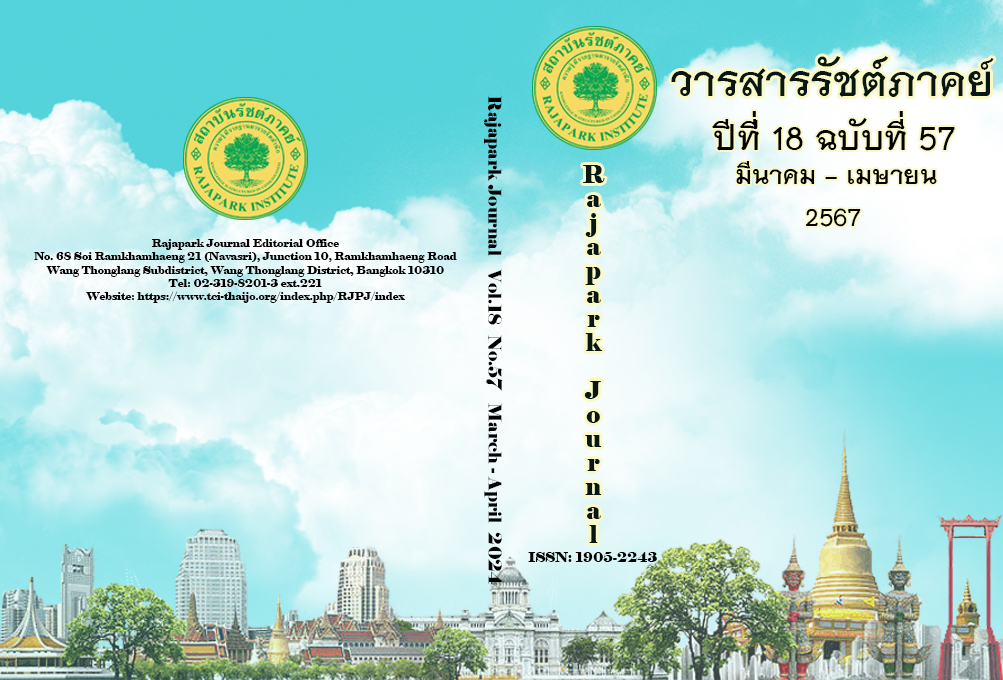Lifelong Learning Psychology to Enhance the Desirable Characteristics of Thai People in the New Normal Era
Main Article Content
Abstract
The academic article aimed (1) to present concepts related to the psychology of lifelong learning, (2) to present the desired characteristics of Thai people in lifelong learning in the new normal era, and (3) to present guidelines for applying the psychology of lifelong learning to enhance the desired characteristics of Thai people in the new normal era. Applying the concept of lifelong learning psychology theory will help to understand the development of learners. Core concepts presented in this article include the process of a growth mindset, meaningful learning theory, and the concept of self-directed learning. The desired characteristics of Thai people in the new normal era are as follows: (1) have the ability to learn by themselves; (2) have the ability to access technology; (3) have preparedness skills to deal with the changing situation. The guidelines for taking advantage of the application of psychological concepts to create lifelong learning in Thai people are as follows: (1) Recognition of the value of knowledge and how it affects self-development intelligence, skills, and attitudes. (2) Understanding learning needs and own interests; (3) Building good relationships with students to share experiences; and (4) Creating lifelong learning habits with discipline.
Article Details

This work is licensed under a Creative Commons Attribution-NonCommercial-NoDerivatives 4.0 International License.
Views and opinions appearing in the Journal it is the responsibility of the author of the article, and does not constitute the view and responsibility of the editorial team.
References
Achavanuntakul, S. (2021). 'New disease' creates a 'new world of learning': The future of Thai education after COVID-19. By The 101 World, Interview, January 4, 2021. The Equitable Education Fund (EEF), Thailand. https://www.eef.or.th/future-of-thai-education-after- covid19
Ausubel, D.P. (2000). The Acquisition and Retention of Knowledge: A Cognitive View. Springer.
Blackburn, B. (2015). Motivating Struggling Learners: 10 Ways to Build Student Success. Routledge.
Dweck, C. (2006). Mindset: The New Psychology of Success: How We Can Learn to Fulfill our Potential. Ballantine.
Dweck, C. (2012). Mindset and Malleable Minds: Implications for Giftedness and Talent. Psychology and Neuroscience to Gifted Education. National Research Center on the Gifted and Talented, Connecticut: Storrs.
Grant, H., & Dweck, C. (2003). Clarifying Achievement Goals and their Impact. Journal of Personality and Social Psychology, 85(3), 541–553. https://doi.org/10.1037/0022- 3514.85.3.541
Hwang, Y.K., & Lee, C.S. (2018). The Moderating Effects of Growth Mindset on the Relationship between Academic Grades and Self-Esteem. Journal of Engineering and Applied Sciences, 13(Special, 4), 3848-3852. https://docsdrive.com/?df=medwelljournals/jeasci/2018 /3848-3852.pdf
Isarapreeda, W. (2019). Developing efficient Webquest-based instruction through online social network for enhancing analytical thinking skill, evaluative thinking, and self-directed learning behavior of teacher education students. Journal of Education Naresuan University, 23(4), 330-342. https://so06.tci-thaijo.org/index.php/edujournal_nu/article/view/183529
Jenzen, E. (2019). Poor Students, Rich Teaching: Seven High-Impact Mindsets for Students from Poverty. Revised Edition. Solution Tree Press.
Knowles, M.S. (1984). Self - directed learning: A neglected species (3rd ed). Gulf Publishing Co.
Mueller, C. M., & Dweck, C. S. (1998). Praise for intelligence can undermine children's motivation and performance. Journal of Personality and Social Psychology, 75(1), 33-52. https://doi.org/10.1037/0022-3514.75.1.33
Office of the Basic Education Commission. (2004). Report on quality education that is a standard for Thai children that are desirable in society. Teachers' Council of Ladpraow Printing House.
Office of the National Education Commission. (2000). Lifelong learning strategies for the 21st century: United Kingdom. Teachers' Council of Thailand Trade Organization.
Robin, F. (2017, April 20). 10 Characteristics of a lifelong learner. utmbHealth. https://www.utmb.edu/impact/home/2017/04/20/top-10-characteristics-of-a-lifelong-learner
Sakcharoen, P. (2015). Adult learning theory and the concept of self-directed learning: learning processes for promoting lifelong learning. Journal of the Royal Thai Army Nurses, 16(1), 8-13. https://he01.tci-thaijo.org/index.php/JRTAN/article/view/35127
Sungsri, S. (2006). Long distance Education. Sukhothai Thammathirat Open University.
Suwanpitak, S. (2000). Self-directed learning. Southern Non-Formal Education Center Printing Press.
Uengchokchai, C. (2015). Development of a model to promote informal learning to enhance the characteristics of being a lifelong learning person for youth[Doctoral Dissertation, Chulalongkorn University].
UNESCO Institute for Education. (2001). Revisiting Lifelong Learning for 21st Century. Hamburge Art Angle Printshop.
Vedder-Weiss, D., & Fortus, D. (2013). School, Teacher, Peers, and Parents’ Goals Emphases and Adolescents’ Motivation to Learn Science in and out of School. Journal of Research in Science Teaching, 50(8), 952–988. https://doi.org/10.1002/tea.21103
Wassanasompong, W. (2020). The effect of learning model for happiness of learning on cognitive domain based on the concept of Benjamin S. Bloom in anatomy and physiology subject[Doctoral Dissertation, Srinakharinwirot University].
Yokchu, K. (2018). Education and strengthening the thinking framework of teaching professional Students[Doctoral Dissertation, Srinakharinwirot University].


